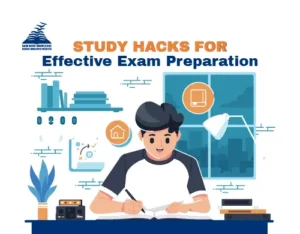School life is a treasure trove of knowledge, but navigating it can be a whirlwind without the right compass. Students often struggle to manage their school and self-study time. Meanwhile, they are under immense pressure to achieve high marks in their exams and tests. It makes students anxious and affects their academic and personal lives.
However, it is possible to create a balance with good study habits for students. It will further help them excel academically and avoid cramming and struggling one night before the exams.
Simple measures to develop effective study practises
- Set Aims
- Schedule Time for Study
- Study at the Same Time and Location
- Take Time Off
- Create Notes
- Take Sample Tests
- Utilise your Learning Style
8 TIPS TO DEVELOP GOOD STUDY HABITS ARE
Analyse the syllabus and prioritise Subject
Do not neglect to establish study objectives for each subject you must cover. Your objectives may be content-based or time-based. Keep in mind that your studying may take longer than usual on occasion. Therefore, it is perfectly fine to require two or three additional days to complete the curriculum. Ensure that you are not adhering to a schedule that could negatively affect your health.
Also, remember, our brain works like radio waves. Interference occurs when inputs are too close together. When several types of learning are being done at the same time, interference occurs. Courses on related topics should be studied at different times. When you’re done with maths, devote an hour to learning about history instead of chemistry or statistics.Schedule your study time in advance
Students can never be too proactive about planning their future success. Therefore, a student with good study habits has to establish a study regimen, including how many hours per week and what subjects will be covered, and stick to it.
Students gain maturity and the ability to take on greater challenges as a result of this. The time of day when everyone feels drowsy has been determined by studies. You shouldn’t try to study then (but you shouldn’t sleep, either; naps rarely help). Plan some other form of physical exercise, like entertainment, during that time instead. Use the opportunity to organise your notes, clean your workspace, gather your textbooks, or study with a classmate if you’re buried under a mountain of homework.Take notes regularly
Students who take notes while studying are better able to maintain concentration and evaluate the material. It will aid students in remembering key ideas come exam time. Using a combination of several numeral systems (Arabic, Roman, or symbols), students can create their own bullet system to organise their notes.
Reduce the length of your notes by using symbols and abbreviations. Students are also encouraged to get creative when taking notes by drawing pictures, constructing thinking bubbles, or using any other method that helps them zero in on the most important information.Take Breaks
Taking a break can help improve focus, vigour, and memory recall. You will be most productive if you study for about an hour and then take a break of around fifteen to twenty minutes. During this time off, you can warm up with some light workouts. You may also go for a brief stroll, listen to some upbeat music, visit with a friend, have a hot shower, or just sit and think about life. Superfoods, such as blueberries, avocados, dried fruits, yoghurt, etc., can provide extra nutrients and revitalise your body. This brief break should help you feel refreshed.
Take Mock Exams and Adapt Your Study Methods
A great way to help students learn to evaluate their own work is through practise sets. Taking a test can help you see where your understanding falls short of the original study materials. Making flashcards, writing your own questions based on the course material, looking for practise sets online, etc. are all viable options.
The best approach to learning is to use your own unique learning style. You can learn more about a topic if you try to put what you’ve learned into your own words. Include your own, original summary of the topic as well.Group up to study
Find classmates that are just as committed to doing well as you are. Instruct them to get together and study. Finding the perfect study group may do wonders for your motivation and ability to absorb course content.
Pick your friends wisely. If your study group is made up of friends, you may find that you spend less time learning and more time catching up. Select bright, involved, and motivated individuals. Make use of each other’s skills. An excellent study buddy would be someone who does poorly in a topic you excel in and badly in one you find puzzling. You two can be each other’s supporters.Play memory Games
Playing memory games can aid in the retention of complex information. Concepts can be memorised through the use of word associations or visualisation strategies. These can be of great assistance on a test.
Seek Assistance
It’s very normal to feel trapped when trying to solve an issue. Some of the material is also challenging to grasp. Therefore, it is preferable to seek assistance from an expert who can provide a new perspective on the issue at hand. You may learn from anybody with relevant life experience, including parents, teachers, professors, friends, seniors, and others. If you think you may benefit from coaching, hiring a tutor is an option.
Conclusion
When it comes to academic excellence, the practice of good study habits stands as the bedrock of achievement. It is not difficult at all to develop effective study practises in order to achieve positive academic outcomes. It would be ideal if you could resist all types of distractions. Also, keep in mind that health is prosperity. You should be sufficiently active and energetic to maintain good study habits. You can also seek assistance from nature, as nature serves as a healer for all. Place several houseplants on your study table. With these methods and tools, you will be well on your way to academic prowess. Go forth, and let the beacon of knowledge illuminate your path to excellence.






